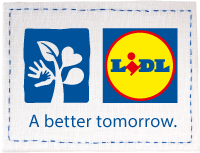Our Lidl sustainability strategy drives our engagement with raw materials and highlights our long-standing commitment to sourcing deforestation-free products. We take responsibility and place sustainability at the centre of our actions. We support and endorse the goals of the EU regulation for deforestation-free supply chains.
In our partnership with WWF, we want to ensure responsible international sourcing of critical raw materials and the establishment and expansion of traceable, deforestation- and conversion-free supply chains. Unless otherwise stated, the following targets apply to our own-brand products (standard and promotional range) in Northern Ireland and 31 Lidl countries. Considering regulations such as the EUDR approach, we have set ourselves the following targets.
Deforestation- and conversion-free raw material procurement
We are committed to sourcing high-risk raw materials such as soy, palm oil, cocoa, coffee, beef, wood, cellulose, and paperfrom deforestation- and conversion-free supply chains. To ensure this, we continuously refine our raw material strategy to prevent deforestation and land conversion for our own-brand products. This approach aligns with the Accountability Framework Initiative (AFI) and the EU Deforestation Regulation, and is based on the EUDR legislation.
Compliance with deforestation and conversion free cutoff dates*
We ensure that both we and our suppliers adhere to the cut-off dates for deforestation and conversion free set by the AFI and the EU Deforestation Regulation. This applies to the high-risk raw materials soy, palm oil, cocoa, coffee, beef, wood, cellulose and paper.
* Each standard defines a cut-off date, marking the point after which deforestation for growing raw materials is prohibited at a specific location. These dates vary between standards.
Traceability and supplier engagement
We require all current and new suppliers to adopt a policy that ensures their operations are free from deforestation, land conversion and exploitation by the end of the 2026 financial year. This commitment goes beyond the legal requirements.
Responsible soy supply chains
As part of the partnership, we are committed to creating fully traceable soy supply chains that are free from deforestation, conversion and exploitation. To achieve this, we will thoroughly asses the origin of soy used in the feed of animal products such as chicken, eggs and pork – which accounts for the majority of soy use – as well as soy used directly in our supply chains (alternative proteins and soy products). This analysis will help us identify areas in need of action.
In addition, we will work with the Collaboration for Forests and Agriculture (CFA) to evaluate and address issues of deforestation, land conversion and exploitation within our own soy supply chains. Our goal is to ensure that, in the long term, our soy supply chains are completely traceable and free from deforestation, conversion and exploitation.
Responsible palm (kernel) oil
Starting from 2025 r, we are committed to sourcing only traceable palm and palm kernel oil that is free from deforestation, land conversion, and exploitation. To ensure , 100% of our palm and palm kernel oil used in both food and non-food products must meet the RSPO Segregated or EU Organic standards. In addition, 100% of the derivatives should at least comply with the RSPO Mass Balance Standard.
Responsible cellulose and paper
Our goal is to exclusively source traceable, deforestation, conversion and exploitation-free paper and cellulose products on an international scale by the end of August 2025.
To achieve this, we will analyse the quality and origin of paper and cellulose products. This analysis will help us develop a comprehensive long-term strategy to ensure that all paper and cellulose products are fully traceable and responsibly sourced.
This includes cellulose and paper in our own-brand products, their labels and packaging in Northern Ireland and 31 Lidl countries. The FSC, FSC mix, recycling and, in exceptional cases, PEFC standards are accepted.
Responsible sourcing of cocoa
Our goal is to sell fully traceable and sustainable cocoa products by the end of 2027.. To achieve this, we will increase the proportion of sustainably certified cocoa to 100% by the end of 2025. The minimum standards accepted are organic (EU), Rainforest Alliance and Fairtrade.
A key component of our efforts involves analysing the origins of our cocoa. This analysis will guide the development of a comprehensive sustainable cocoa sourcing strategy, which we are developing together with WWF. This strategy involves: investing in full traceability for cocoa beans and butter; participating in conservation projects in key or high-risk cultivation areas; and engaging with relevant stakeholders through cocoa initiatives committed to sustainable production.
Sustainably certified coffee: coffee products and roasted coffee
We are committed to achieving 100% sustainably certified coffee products, including coffee capsules, instant coffee, and cappuccino. Our goal is to ensure that starting from 2028,, all coffee products sold will carry a recognized sustainability label. The minimum accepted certifications are Organic (EU), Rainforest Alliance, and Fairtrade.
In addition, we are also committed to continuously increasing the proportion of sustainably certified roasted coffee to 100%
Certified tea supply chains
Another goal we have set ourselves as part of our partnership with WWF is to ensure fully certified tea products. This includes all black teas, green teas, and rooibos teas from our own-brand products in Northern Ireland and 31 Lidl countries. Organic (EU), Rainforest Alliance and Fairtrade certifications are accepted.
More information about our Lidl raw materials strategy
https://www.abettertomorrow-lidl-ni.co.uk/sourcing/









